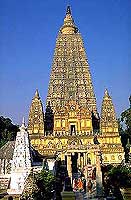Bhiksuni Ratana's view on Mahabodhi issue flawed
by Visakha Kawasaki, Kandy, Sri Lanka, The Buddhist Channel, Dec 19, 2007
I wonder why Bhiksuni Ratana ("The true situation inside the Mahabodhi temple in Bodhgaya") treats the matter of the great Mahabodhi Temple as if it began when she started to cut out some clippings from Indian newspapers, in 2002?
 The saga did NOT begin then, as she would have us believe.
The saga did NOT begin then, as she would have us believe.
The Buddhist Emperor Asoka visited Buddha Gaya in approximately 250 BC, to establish a monastery and a shrine at the spot where Gotama became the Buddha. Thus Ashoka is regarded as the founder of the Mahabodhi Temple. From its beginning, the temple was a revered destination for pilgrims from all over the Buddhist world.
During the 12th century, northern India was invaded by Muslim armies. In the 16th century, a wandering Hindu sadhu settled down and became chief landlord in the area, claiming ownership of the Mahabodhi Temple grounds as well.
The mahant’s palace contains many precious Buddhist artifacts, taken from the temple grounds, and the mahant deserves the blame for the ugly pink structures on the left of the walkway as one enters the compound, which enshrine Buddha images painted to look like Hindu gods.
Under Sir Alexander Cunningham, the British government of India began to restore the temple. In 1891, the Sri Lankan Buddhist activist, Anagarika Dharmapala, began the campaign to return control of the temple to Buddhists, over the objections of the mahant. The campaign was not really successful, although control did pass from the Hindu mahant to the Bihar state government in 1949. The temple management committee, which oversees the temple (and the massive donations received from Buddhist pilgrims) has nine members, a majority of whom, including the chairman, must by law be Hindus.
If Bhiksuni Ratana is satisfied that the Mahabodi Temple, the most important and revered site in the world for Buddhists is under the control of Hindus, she is in the minority among Buddhists. If she is unconcerned about threats from Hindu fundamentalists (See “Buddhist monks rue BJP's claim over Mahabodhi temple,” New Kerala, Aug 24, 2005, The Buddhist Channel), she is uninformed.
If she can’t believe that there are wealthy Buddhists who would pay a huge amount for a branch of the Bodhi tree and that that money could tempt some on the committee to cut a branch, she’s naive. If she thinks that Bihar politics are all sweetness and light, she is deluded.
Her “retelling” of the saga seems both incomplete and unfair. Perhaps she is prejudiced against “Ambedkarite Buddhists,” who are, after all, carrying on the struggle begun by Anagarika Dharmapala in 1891 for all of us. Shouldn’t we Buddhists be grateful to them for trying to end the unreasonable Hindu control over this temple that is our most precious Buddhist heritage?

 The saga did NOT begin then, as she would have us believe.
The saga did NOT begin then, as she would have us believe.